Seattle, Tacoma Ports Plan to Phase Out Maritime Emissions
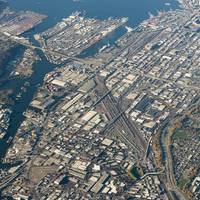
The ports of Seattle, Tacoma and the combined container operations of The Northwest Seaport Alliance (NWSA) have adopted near-term implementation plans that guide emission reduction efforts for seaport-related activities.The Northwest Ports Clean Air Strategy covers six sectors of port activity: oceangoing vessels, cargo-handling equipment, trucks, harbor vessels, rail and port administration and tenant facilities. The recently adopted implementation plans direct changes in equipment…
EPA Provides $650K for Diesel Engine Refits
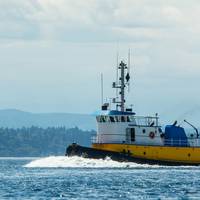
The U.S. Environmental Protection Agency (EPA) is providing the Puget Sound Clean Air Agency (PSCAA) with $650,000 to reduce diesel emissions from engines on up to eight vessels operating in the Puget Sound region. The project will provide vessel owners with incentives to scrap and replace 12-19 old Tier 0 engines with newer, more-efficient and lower-emission Tier 3 engines on six to eight harbor vessels operating in Puget Sound, Lake Union and Lake Washington. Combined with the mandatory match of $891,000, the total project cost is $1,541,000.
Ship Manager Fined for Emissions Regulations Breach
A ship management company has been fined $283,500 in connection with a breach of clean air regulations in the United States, the International Transport Intermediaries Club (ITIC) has confirmed. ITIC reports that an inspector of the California Air Resources Board, the clean air agency of the state of California, boarded a ship in July 2011 at a terminal in Los Angeles. The chief engineer was asked if he was aware of the revised 2009 California clean air regulations which required vessels to switch main engine, auxiliary engines and auxiliary boilers to low-sulphur fuel when in California-regulated waters. The chief engineer said he was only aware of the requirement to switch auxiliary engines to low-sulphur fuel in accordance with regulations effective from January 1, 2007.
American NW Ports Set Marine Emissions Goals
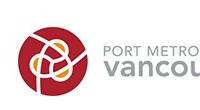
The ports of Seattle, Tacoma and Metro Vancouver, Canada, aim to cut diesel emissions by 75 percent per ton of cargo moved by 2015 and 80 percent by 2020, from a 2005 baseline. Factoring in projected cargo growth, this will result in overall reductions of 70 percent by 2015 and 75 percent by 2020. The ports also set a goal to reduce greenhouse gases by 10 percent by 2015 and 15 percent by 2020 per ton of cargo moved. The goals are part of the 2013 Northwest Ports Clean Air Strategy Update, which was adopted this week.
Northwest America Ports Release (Draft) 2013 Clean Air Strategy
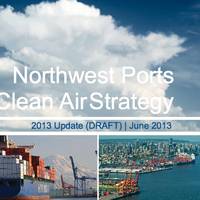
The Port of Seattle, along with the Port of Tacoma and Port Metro Vancouver, implemented the first international ports clean air program in 2008, & now releases their DRAFT 2013 strategy. Agency partners include U.S. Environmental Protection Agency, Puget Sound Clean Air Agency (PSCAA), Washington Department of Ecology, and Environment Canada. Read the 2013 DRAFT Strategy here.
Pacific Fishermen Shipyard Purchases Union Bay Assets
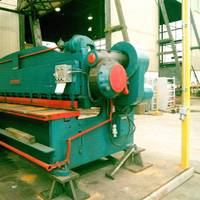
Pacific Fishermen Shipyard and Electric has purchased selected assets of Union Bay Fabrication, located at Emerald Landing and the former Tippet Shipyard. The purchase included a Cincinnati Model 2512 Plate Shear and 250 ton Mechanical Press Brake Model K5-10. Together they provide capacity to bend and shear heavy steel plates up to 12 feet width and ¾” thickness, dependent on width. The purchase also included weld lead, water and air hose, electrical cords, a welding 4-pack, ventilation fans and miscellaneous shipbuilding equipment.
NAMEPA Seattle Seminar May 25, 2011

April 25, 2011—The North American Marine Environmental Protection Association (NAMEPA) will present its Environmental Intelligence in Shipping Seminar Series in Seattle on May 25th at the Bell Harbor Conference Center beginning at noon with lunch. The seminar will explore many of the environmental issues facing the Port of Seattle in its centennial year, including air emissions, storm water runoff, marine life habitats, and lessons from the Deepwater Horizon incident. “Seattle has been one of the most proactive ports in North America,” stated NAMEPA Co-Founder Clay Maitland.
Northwest Ports Grants for Environmental Program
The ports of Tacoma and Seattle, and the Puget Sound Clean Air Agency announced a combined match of $318k in additional funding for the Clean Air Agency’s Puget Sound Ports Cargo-Handling Equipment Replacement and Retrofit Program. This comes on top of $850k from the U.S. Environmental Protection Agency (EPA), for this new initiative that combines environmental stewardship efforts of several agencies. The funding supports the retrofit or replacement of 38 off-highway trucks, cranes and forklifts at the Port of Seattle, which is approximately 10 percent of its fleet. At the Port of Tacoma, 50 to 60 terminal tractors, cranes, off-highway trucks and general industrial equipment will be retrofitted. That’s about 14 percent of its fleet.
Washington State Ferries to Shift to Clean Fuel Initiative
Washington State Ferries (WSF)/Washington State Department of Transportation (WSDOT) will shift the entire ferry fleet to low-sulfur diesel fuel, test ultra-low sulfur diesel fuel, and test biodiesel fuel—all steps that will improve air quality by reducing the amount of harmful substances in the ferries’ diesel fuel exhaust. The ferry system also has upgraded its vessels with more-efficient engines and made operational changes that have reduced fuel consumption and emissions, and will continue seeking new ways to improve fuel efficiency. As a result of all these changes, nearly 10,000 fewer tons of pollutants will be released into the air by ferry fuel emissions.
Pacific Northwest Ports Aim to Reduce Emissions
The Tacoma Daily said ports of Seattle, Tacoma and Vancouver, Canada have proposed performance goals to reduce particulate matter by 70 percent from ships at berth and 30 percent from cargo handling equipment, according to the Pacific Northwest Ports Clean Air Strategy announced Wednesday. The strategy proposes performance goals aimed at reducing diesel emissions and greenhouse gases from port-related sources. The three ports plan to accomplish the emissions reduction goals for ships and cargo handling equipment by 2010. The strategy also will address emissions from port-related truck, train and harbor craft activity and includes long-term goals for additional emissions reductions.
HAL’s Zaandam First Cruise Ship to Sail with Emissions Reduction Technology
When Holland America Line's ms Zaandam sets sail from Vancouver, B.C., on Earth Day, April 22, it will be unlike any other cruise ship at sea, featuring new cutting edge emission reduction technology recently installed during a two-week drydock. In cooperation with several United States and Canadian government and regulatory agencies, Holland America Line has launched a technology demonstration project, designed to demonstrate the feasibility of using sea water to "scrub," or reduce, engine emissions on oceangoing vessels. BP, uses the natural chemistry of seawater to remove virtually all sulfur oxide (SOx) as well as significantly reduce particulate matter emissions.
HAL to Conduct Air Emission Reducing Study
To determine the feasibility of new technology designed to dramatically reduce air emissions on seagoing vessels, Holland America Line plans on conducting a seawater scrubber feasibility project aboard one of its cruise ships thanks to the assistance of a $300,000 EPA/West Coast Collaborative grant and $100,000 contribution from Puget Sound Clean Air Agency. The total cost of the installation is more than $1.2 million. This innovative project is intended to demonstrate how advanced seawater scrubbing reduces air emissions on large oceangoing vessels. The results will determine whether this technology could be rolled out to new oceangoing vessels, as well as retrofitting existing vessels.









